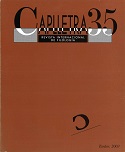Gramaticalització i adquisició de llengües: l'adquisició de la morfologia de passat en aprenents de català com a segona llengua
DOI:
https://doi.org/10.7203/caplletra.35.4910Keywords:
gramaticalització, adquisició de llengües, morfologia, temps passat, català, segona llengua Abstract
Abstract
This article applies grammaticalization theory to the process of acquisition of past morphology (perfective and imperfective) by learners of Catalan as a foreign language. It argues that diachronic and acquisitional grammaticalization show clear parallels in the evolution of past morphology. These parallels are contrasted with the aspect and discourse hypotheses, which argue that lexical and discourse characteristics of verbal predicates can explain the development of past morphology in a second language. Beginner data on the acquisition of Catalan confirmed that both lexical aspect and discourse grounding contribute to the grammaticalization of past meaning in interlanguage.
 Downloads
Downloads
Downloads
Published
How to Cite
-
Abstract459
-
PDF (Català)237
Issue
Section
License
Authors submitting work to Caplletra for publication must be the legitimate holder of the usage rights. Legitimacy for the purposes of publishing the work must also include images, tables, diagrams and any other materials that may complement the text, whether they are the author of such material or not.
Copyright: on publishing their work in the journal, the author grants Caplletra. Revista Internacional de Filologia usage rights (reproduction, distribution and public communication) for both the paper printed version and for the electronic version.
All work published in Caplletra is covered by the Creative Commons license type Attribution-NonCommercial-NoDerivatives 4.0 (CC BY-NC-ND 4.0).
RESPONSABILITY
Caplletra. Revista Internacional de Filologia does not necessarily identify with the points of view expressed in the papers it publishes.
Caplletra. Revista Internacional de Filologia accepts no responsibility whatsoever for any eventual infringement of intellectual property rights on the part of authors.






